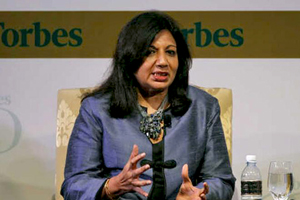New Delhi, Sep 21: A citizens' group led by philanthropist Kiran Mazumdar Shaw today moved the Supreme Court seeking intervention in the ongoing legal battle between Karnataka and Tamil Nadu over distribution of Cauvery water and protection of drinking water rights of residents of Bengaluru and surrounding districts.
 Noting that it was a dispute between two states, an apex court bench headed by Justice Dipak Misra said it would decide whether the citizens' group can be allowed to intervene in the matter on the next date of hearing.
Noting that it was a dispute between two states, an apex court bench headed by Justice Dipak Misra said it would decide whether the citizens' group can be allowed to intervene in the matter on the next date of hearing.
"We will hear you on September 27, the next date of hearing of the main petition," the bench, also comprising Justice U U Lalit, said.
Senior advocate Harish Salve, appearing for Bangalore Political Action Committee (BPAC) in which Shaw is President and Mohandas Pai the Vice President, said the citizens of Bengaluru need adequate drinking water and their right to life needed to be protected by this court.
Senior advocate Shekhar Naphade, appearing for Tamil Nadu, opposed the submission saying these kind of pleas cannot be entertained in an inter-state dispute of this nature.
"That the present application is being filed by the applicant in the aftermath of the violence that took place in the city of Bengaluru, since the applicant is of the belief that there are extra-ordinary circumstances in the city and its adjoining areas which needs to be addressed through the intervention of this Hon'ble Court," the BPAC plea said.
"There is an acute drinking water problem in the city of Bengaluru and certain other districts of South Karnataka. The annual requirement of Bengaluru city alone is more than 19 TMC of water to be supplied to the citizens by the authorities of the State of Karnataka. The annual drinking water requirements of the Cauvery basin districts including the Bengaluru is roughly about 26 TMC (approximately)," it said.
The apex court today asked Karnataka to release 6,000 cusecs of Cauvery water per day to Tamil Nadu from tomorrow till September 27. Yesterday, the Cauvery Supervisory Committee had asked Karnataka to release 3,000 cusecs water to Tamil Nadu.
BPAC, in its plea filed through lawyer Aparna Bhat, said "the southwest monsoon for the year 2016-17 has miserably failed over most parts of Karnataka and especially in the catchment areas of the Cauvery River. The lack of rainfall is also evident by the reservoir levels in the major reservoirs of the Cauvery basin in Karnataka, which have a huge shortfall of inflows, and thereby the drastic decrease in the storage capacities of the respective reservoirs."
"The approximate live storage of Karnataka's reservoirs (Harangi, Hemavathi, K.R.S and Kabini) as on 16.09.2016 is only 28.77 TMC as against the total drinking water requirements of Bengaluru, Mysuru, Mandya and other Cauvery basin districts which is 26 TMC (approximately)," it said.
If further releases are made to Tamil Nadu, then there would not be enough water available in these reservoirs for supply to the citizens of Bengaluru and other towns, it said.
"This is indeed an alarming situation which requires urgent attention of the relevant authorities, and it is also the need of the hour that the present scenario is brought to the notice of this court," the plea said.





Comments
Please madam ,,, let them (tamil nadu) use a little bit of what God given us (Karnataka) ...
When we Give, God will increase our resources... so please stop your fame works....
Add new comment